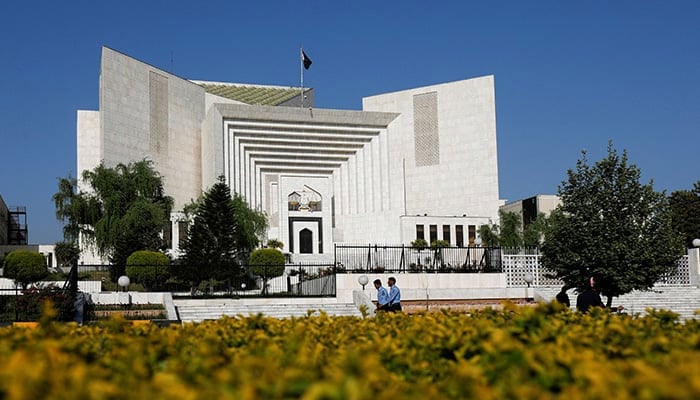Supreme Court dismisses pleas against IHC judges' transfer, terms it constitutional
Apex court rules Justice Sarfraz Dogar can continue to work as IHC acting chief justice
June 19, 2025

- Justice Mazhar announces 3-2 majority verdict.
- Justice Afghan, Justice Hassan rule in favour of pleas.
- Five IHC judges challenged Justice Dogar’s appointment in Feb.
ISLAMABAD: The Supreme Court on Thursday dismissed pleas filed against the transfer of judges from three high courts to the Islamabad High Court and termed them as being constitutional while ruling that Justice Sarfraz Dogar can continue to work as IHC's acting chief justice.
The verdict was announced by Justice Muhammad Ali Mazhar, who was heading the five-member constitutional bench hearing petitions filed by five IHC judges, the Karachi Bar Association (KBA), the IHC Bar Association, and others against the transfer of Justice Sarfraz Dogar from the Lahore High Court, Justice Khadim Hussain Soomro from the Sindh High Court, and Justice Muhammad Asif from the Balochistan High Court. The three judges were among those transferred to the IHC.
The bench also comprises Justice Naeem Akhtar Afghan, Justice Shahid Bilal Hassan, Justice Salahuddin Panhwar and Justice Shakeel Ahmed.
In February, five judges of the IHC had moved the apex court under Article 184(3) of the Constitution against the appointment of Justice Sarfraz Dogar as the acting chief justice of IHC as well as the transfer of high court judges. The plea was filed by Justice Mohsin Akhtar Kiyani, Justice Tariq Mehmood Jahangiri, Justice Babar Sattar, Justice Sardar Ejaz Ishaq Khan and Justice Saman Riffat Imtiaz.
The IHC judges had urged the apex court to declare that the president does not have unfettered and unbridled discretion to transfer judges from one high court to another, under Article 200(1) of the Constitution, without a manifest public interest, and in a manner that hampers the principles of independence of judiciary and separation of powers.
Their petition also prayed the apex court to declare that in line with the settled law pronounced by the highest court in the case of Aslam Awan and Farrukh Irfan, the inter-se seniority of Respondents No 9-11 shall be determined from the date they take oath as justices of the IHC and would consequently be lower in the seniority list to the petitioners.
The top court had taken up the matter on April 17 and conducted 19 hearings since then. In its 3-2 majority verdict today, the apex court disposed of the multiple petitions with Justice Mazhar, Justice Hassan and Justice Panhwar ruling to set aside the pleas.
Justice Afghan and Justice Ahmad, however, allowed the petitions and set aside the notification of judges' transfer.
In its 5-page judgement, the apex court highlighted that the powers of the president of Pakistan for the transfer of a judge of the high court and the provisions contained under Article 175A of the Constitution for appointment of judges to the apex court and high courts were two distinct provisions dealing with different situations and niceties and did not overlap or override each other.
"The transfer of a judge by the president of Pakistan by means of Article 200 of the Constitution (permanently or temporarily) cannot be construed as a fresh appointment," the short order read.
"The powers of transfer conferred to the president by none other than the framers of the Constitution," it noted.
With regards to Section 3 of the Islamabad High Court Act, 2010, the court ruled that it only divulges that the IHC shall consist of a chief justice and twelve other judges to be appointed from the provinces and other territories and that it was "only germane to the appointment of judges and does not, in any way, mean that a judge can only join the IHC through a fresh appointment and not by way of a transfer or, in other words, that Article 200 does not apply to the IHC, which interpretation would be against the exactitudes of the Constitution".
"Neither can Section 3 of the aforesaid Act supersede/override a constitutional mandate, nor can it control, nullify, or rescind the powers of transfer that are vested in the President of Pakistan under Article 200 of the Constitution," reads the judgement.
Highlighting that the president's powers under Article 200 were regulated and were subjected to his consultation with the CJP, they "did not compromise the independence of the judiciary for the discernable reason that the decision to accept or reject is exclusively within the hands of the judiciary".
"We are sanguine that in normal circumstances, the decision on inter se seniority disputes or disagreements amongst the judges of a high court are within the domain of the chief justice of that high court, at the administrative side, but here the matter relates to the transfer of judges from other high courts to the IHC.
"Thus, the seniority issue is not exactly inter se seniority within the existing strength of judges of one and the same high court, prior to bringing forth the transfer of three judges under Article 200 of the Constitution, but is somewhat cropped up between the transferee judges and the judges that already existed prior to the transfer," the judgment reads.
Partially remanding the matter to the president of Pakistan, without upsetting the notification of transfer, to determine the seniority after examining/vetting the service record of the transferee judges as soon as possible, including the question of whether the transfer is on a permanent or temporary basis, the court order ruled that Justice Dogar could continue to work as IHC's acting chief justice until seniority and nature of transfer (permanent or temporary) of the transferee judges was determined.











